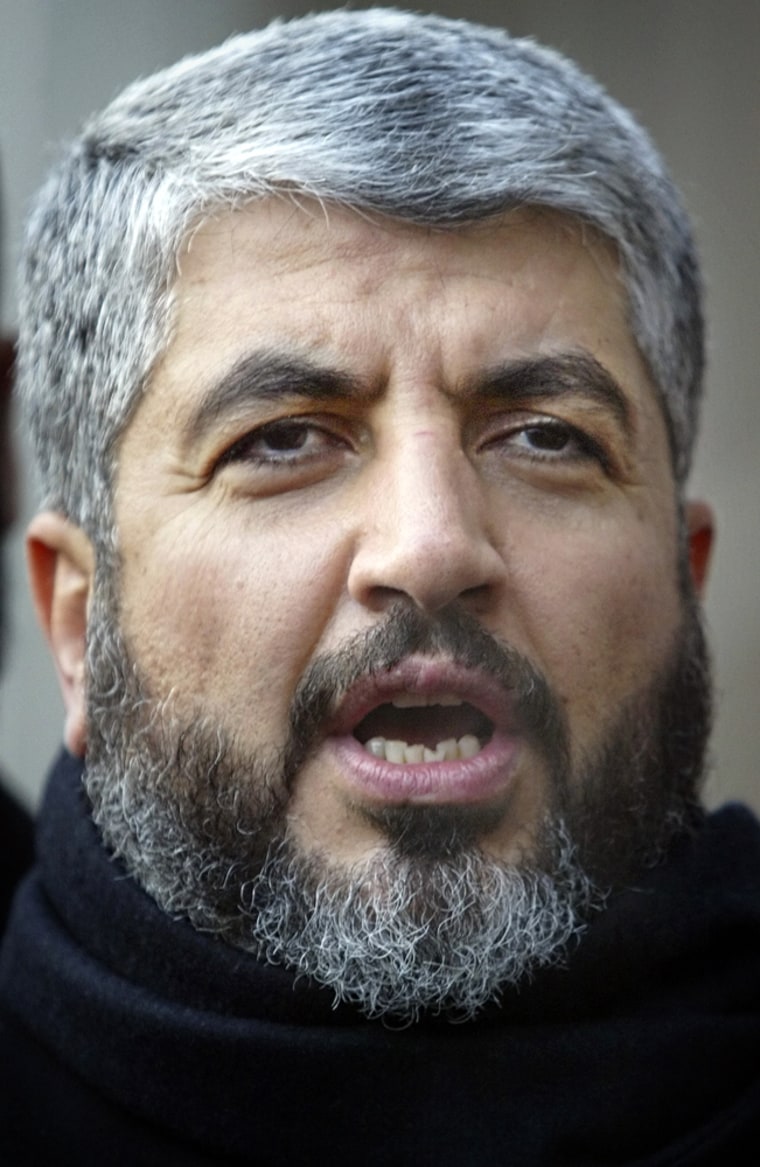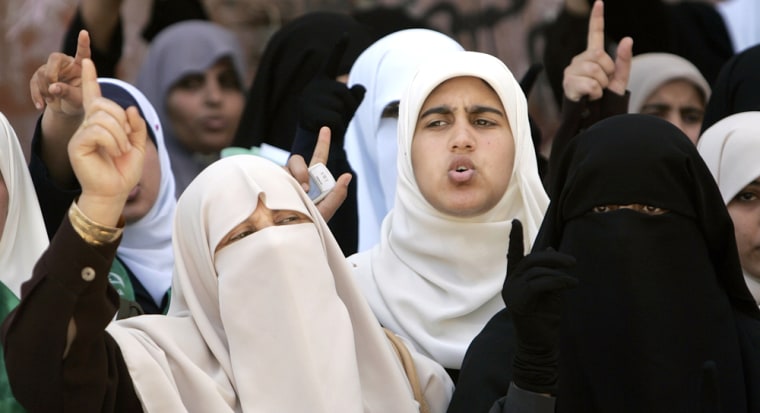Hamas’ turbulent first month in power has laid bare brewing friction between the militant group’s Syria-based hard-line chief and elected leaders in the West Bank and Gaza.
The dispute rages over one central issue — whether Hamas, whose charter calls for Israel’s destruction, should moderate its ideology.
Party hierarchy places supreme power in the hands of Hamas chief Khaled Mashaal, who lives more than 100 miles away from the chaos and impoverishment of the West Bank and Gaza. However, with Hamas now running the Palestinian Authority, that balance of power could shift.
Hamas professes to have a united front. “There is no distinction between inside and outside (leaders),” said Hamas spokesman Sami Abu Zuhri, who lives in Gaza. “This is a conspiracy by some foreign media to try to show there are differences. The movement is united.”
But there’s no denying that Hamas leaders in the Palestinian territories are more pragmatic, if not more moderate, where Israel is concerned. They’ve maintained a 15-month-old truce with the Jewish state, while sending mixed messages — refusing to renounce violence or negotiate with Israel, while speaking vaguely about the possibility of peace in interviews to the foreign media.
Internal debates
A senior Hamas official, speaking on condition of anonymity, said Monday the group was debating whether to adopt a 2002 Arab peace initiative — a move that would implicitly recognize Israel, because the plan envisions the creation of a Palestinian state alongside Israel.

The official said Hamas would not decide quickly, so as not to be seen as succumbing to Western pressure. Israel has rejected the plan, which would involve giving up all of the West Bank and east Jerusalem, captured in the 1967 Mideast War.
Mashaal has made it clear since Hamas swept Palestinian elections that he has no intention of disarming the group or leading it into negotiations with Israel.
Earlier this month, Mashaal denounced as a traitor Palestinian leader Mahmoud Abbas, who belongs to the rival Fatah Party and seeks a peace deal with Israel. His incendiary remarks were in sharp contrast to the Hamas government’s studied avoidance of publicly confronting Abbas, the Palestinians’ front man in the struggle for international legitimacy. Several members of the Hamas-led government publicly criticized Mashaal in a sign of a growing rift.
Hamas’ hierarchy suggests that the government is bound to carry out the policies of Syria-based Mashaal, who was anointed by the group’s key decision-making body, the secretive Shura Council. And upon joining Hamas, members vow an oath of allegiance to the group’s supreme leader.
But others think Hamas “insiders” in the West Bank and Gaza Strip might gain the upper hand because they have cultivated close ties with the Palestinian people — something that Mashaal, who left his native West Bank 40 years ago, cannot claim.
If the Hamas Cabinet “succeeds in governing the Palestinian society and the occupied territories ... I think the weight will shift toward the inside,” said Basem Ezbidi, a political science professor at Bir Zeit University in the West Bank. “But if Hamas loses ground and fails in doing so, I think the weight will continue being in the outside section.”
'Power will spoil them'
Hamas’ efforts to govern during its four weeks in power have been crippled by cutoffs of desperately needed Western aid, Israel’s freeze on hundreds of millions of dollars in annual transfer payments, and Abbas’ undercutting the new government by wresting new powers for himself.
Former Palestinian Planning Minister Ghassan Khatib, an independent, thinks the hierarchical discipline that made Mashaal the unassailable ruler might unravel. “This is the nature of political groups or organizations,” Khatib said. “When they are underground or subject to harassment from the authorities or the occupation, they have to be unified, they have to be disciplined in order to survive. ... The fact that they are in power will spoil them.”
Hamas’ political arm amassed much of its power from the tens of millions of dollars it raised in the Muslim world in the two decades before the group swept Jan. 25 elections — years when Hamas’ activities were focused on health, welfare and education programs, and fighting Israel with suicide bombings and rockets.
That money may be less influential now, because it is having a hard time reaching the Palestinian territories. The U.S. is pressing international banks to prevent cash from flowing to the Palestinian Authority, because it views Hamas, which killed hundreds of Israelis in suicide bombings, as a terrorist organization.
A former physics teacher born in 1956 in the West Bank, Mashaal unwittingly leapt onto the international stage in 1997 when Israeli spies injected him with poison in Jordan, where he was living at the time. When Jordan’s King Hussein learned of the attempt on Mashaal’s life, he enlisted President Clinton to pressure Israel to deliver an antidote, Jordanian officials said.
'A reflection of the strength inside'
As supreme leader, Mashaal is thought to have final control over both the outside political wing and the various political wings in Gaza and West Bank. The political wings are thought to set Hamas’ general policy on suicide and other attacks, but the group’s military wing carries them out.
Two weeks ago, when he thought Abbas went too far by vetoing Hamas’ plan to form a militants’ army, he didn’t hesitate to speak out.
“We can understand that Israel and America are persecuting us, and seeking ways to besiege and starve us, but what about the sons of our people who are plotting against us, who are following a studied plan to make us fail,” Mashaal said, without mentioning Abbas by name.
With Fatah protests breaking out in the West Bank and Gaza over Mashaal’s remarks, the Hamas government’s deputy prime minister, Nasser Shaer, promptly insisted Mashaal’s statements did not reflect government opinion.
“The fact that the deputy prime minister was able to say that the government is not responsible for whatever ... Mashaal is saying outside is a reflection of the strength inside,” Khatib said.
